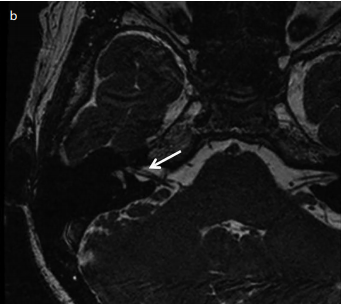Muckle–Wells syndrome (MWS), a subclass of cryopyrin-associated periodic syndrome (CAPS), sometimes includes complications of bilateral progressive sensorineural hearing loss. A 48-year-old woman had been diagnosed with pediatric rheumatic arthritis at aged 6 years; however, systematic therapy with prednisolone and methotrexate showed limited efficacy for her general fatigue and arthritic pain, and it never improved the hearing level. She underwent a cochlear implant surgery for progressive profound bilateral hearing loss. After 7 years of cochlear implant surgery, she was diagnosed with MWS by genetic tests. Interleukin (IL)-1β monoclonal antibody therapy (canakinumab) improved general fatigue and arthritic pain but showed no effect on cochlear symptoms. Owing to successful cochlear implant surgery, she reacquired the hearing and communication function while being able to understand over 90% of monosyllables and words in the sound field of her daily life at 65 dB SPL for the next 13 years of her life. This suggests that peripheral cochlear damage induced by chronic inflammation contributes to the sensorineural hearing loss in cases with MWS, and that cochlear implantation can provide long-term hearing efficacy for patients with MWS with irreversible profound hearing loss.
Cite this article as: Ogawa B, Aoki M, Ohnishi H, Ohashi T, Hayashi H, Kuze B, et al. The Long-Term Efficacy of Cochlear Implantation for Hearing Loss in Muckel-Wells Syndrome. J Int Adv Otol 2019; 15(3): 454-8.


.jpg)
.png)
.png)
